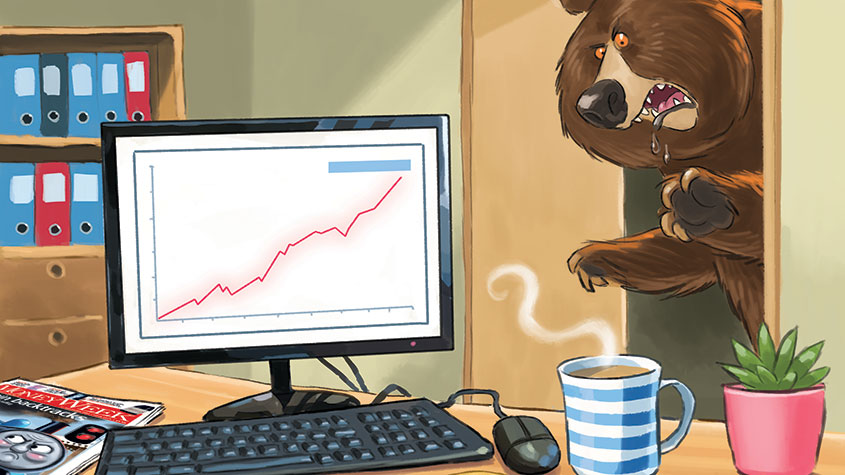Diversify and hold gold
The future is looking very uncertain, says Merryn Somerset Webb. Make sure you diversify your portfolio.

Get the latest financial news, insights and expert analysis from our award-winning MoneyWeek team, to help you understand what really matters when it comes to your finances.
You are now subscribed
Your newsletter sign-up was successful
Want to add more newsletters?

Twice daily
MoneyWeek
Get the latest financial news, insights and expert analysis from our award-winning MoneyWeek team, to help you understand what really matters when it comes to your finances.

Four times a week
Look After My Bills
Sign up to our free money-saving newsletter, filled with the latest news and expert advice to help you find the best tips and deals for managing your bills. Start saving today!
Here at MoneyWeek we are often criticised for worrying too much. This week I wonder if our mistake in 2014 has been not to worry enough. Our cover story looks at the impact of the extraordinarily fast collapse of the oil price on the global economy and markets.
There's a view, discussed by John Stepek, that cheap oil is mostly good because it cuts costs for consumers. We have sympathy with that view. But it isn't that simple. Why? Because the speed of this collapse makes the whole world more unstable.
This is most obvious in Russia, where Muscovites, stunned by the implosion of the rouble, are queuing to buy high-end goods with their fast-devaluing cash (my suggestion last year that political risk is priced into the Russian market is starting to look foolish!).
MoneyWeek
Subscribe to MoneyWeek today and get your first six magazine issues absolutely FREE

Sign up to Money Morning
Don't miss the latest investment and personal finances news, market analysis, plus money-saving tips with our free twice-daily newsletter
Don't miss the latest investment and personal finances news, market analysis, plus money-saving tips with our free twice-daily newsletter
But the effects go far beyond this. They go to other big oil exporters, such as Venezuela, even Norway. They might hit banks that have lent to oil-related ventures. They travel across all the emerging markets hit by investor risk aversion.
And they make it harder for the world's central banks to hit their inflation targets. Throw in renewed fears about deflation and social unrest in the eurozone, and you have to start wondering just how extreme the next policy our central bankers come up with might be.
So what do you do? I think you worry. It may be that this latest round of crises leads to more quantitative easing (QE) than we could have imagined, and that stockmarkets soar as a result. Or it may be that the deflationary bust, which investment guru Russell Napier has forecast for a while (watch my interview with him) is upon us.
It's impossible to know. So, as usual, we'd err on the side of caution. Diversify: our investment trust portfolio is a good place to start. Hold some gold: it won't ever have oil's oversupply problem. Stick with Japan more QE is a given, it's super competitive and corporate profits are rising fast.
Expect the euro to fall (either due to QE or simply to its economic failures). And hold some cash: the greatest fortunes are made by those who can afford to buy at the bottom.
Later in the week, we'll have an interview with tech investor Jim Mellon on the website, with suggestions for long-term investors (it seems that Google is the answer to every question).
Our next issue (out on Tuesday, 30 December) will be jammed with stock tips from our latest roundtable for you to read in the quiet days between Christmas and New Year.
Finally, with a nod to next year, I want to talk about lunch. A lot of you very kindly ask me to come and have lunch with you to talk about some of the ideas in the magazine.
If you want to nail me down, here's your chance: get in quick and you can bid for lunch with me all in an excellent charitable cause at gavelandgrand.com. A very happy Christmas to all our readers.
Get the latest financial news, insights and expert analysis from our award-winning MoneyWeek team, to help you understand what really matters when it comes to your finances.

-
 Japanese stocks rise on Takaichi’s snap election landslide
Japanese stocks rise on Takaichi’s snap election landslideJapan’s new prime minister Sanae Takaichi has won a landslide victory in a snap election, prompting optimism that her pro-growth agenda will benefit Japanese stocks
-
 Alphabet 'is planning a 100-year bond': would you back Google for 100 years?
Alphabet 'is planning a 100-year bond': would you back Google for 100 years?Google owner Alphabet is reported to be joining the rare century bond club
-
 The dangers of derivatives as the “Goldilocks era” ends
The dangers of derivatives as the “Goldilocks era” endsEditor's letter This is no longer a benign environment for investors, says Andrew Van Sickle. But – as the recent pension-fund derivatives blow-up shows – not everybody seems to have grasped that.
-
 What to do as the age of cheap money and overpriced equities ends
What to do as the age of cheap money and overpriced equities endsEditor's letter The age of cheap money, overpriced equities and negative interest rates is over. The great bond bull market is over. All this means you will be losing money, says Merryn Somerset Webb. What can you do to protect yourself?
-
 Investors are bullish – but be very careful
Investors are bullish – but be very carefulEditor's letter Many investors are buying the dip, convinced the latest upswing is the start of a new bull market. The odds are that it’s not, says Andrew Van Sickle. The bear has unfinished business.
-
The MoneyWeek approach to investing
Editor's letter At MoneyWeek, our aim is simple: to give you intelligent and enjoyable commentary on the most important financial stories, and tell you how to profit from them. So how do we do that?
-
 Celebrity bitcoin ads echo the subprime mortgage crisis
Celebrity bitcoin ads echo the subprime mortgage crisisEditor's letter A wave of ads featuring celebrities punting crypto to the masses are reminiscent of how low income Americans were encouraged to take on loans they couldn’t afford, says Merryn Somerset Webb.
-
 Will the UK's property slowdown turn into a house-price crash?
Will the UK's property slowdown turn into a house-price crash?Editor's letter As the cost-of-living crisis intensifies and interest rate rise, it is hard to see reasons for UK house prices to keep rising, says Merryn Somerset Webb.
-
 The unintended consequences of ESG investing
The unintended consequences of ESG investingEditor's letter Many people are refusing to invest in energy companies, citing "ESG" concerns. But we still need fossil fuels, says Merryn Somerset Webb, and will for years to come. Boycotting the sector is a bad idea.
-
 What sardines can teach investors about today's markets
What sardines can teach investors about today's marketsEditor's letter A California tale of “eating sardines” and “trading sardines” can help us divide investments into speculative and real, says Merryn Somerset Webb. Something that's very useful when looking at today’s markets.